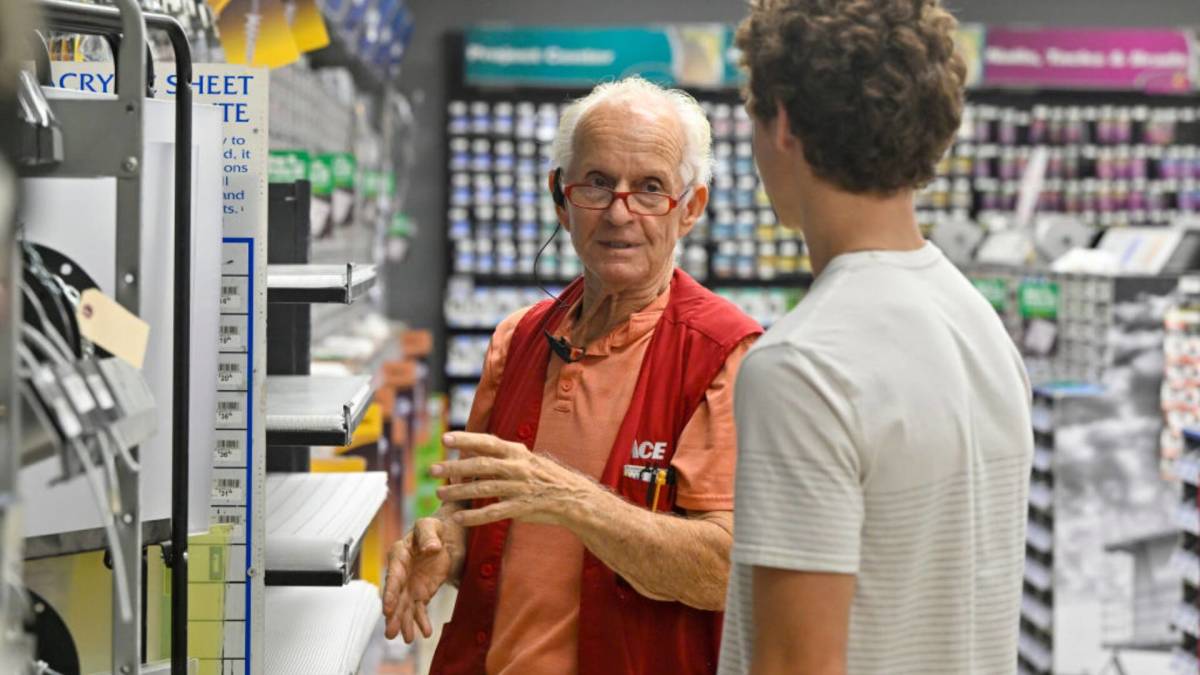[ad_1]
Ace Hardware has long been the underdog in the home improvement retail world, trailing Home Depot and Lowe’s in terms of store size and revenue.
The retailers that dominate the U.S. home-improvement and hardware market, according to the National Retail Federation, are:
- Home Depot, $148.21 billion in sales
- Lowe’s, $81.50 billion in sales
- Ace Hardware, $26.56 billion in sales
- Tractor Supply, $14.88 billion in sales
Even though Ace’s sales are a fraction of Home Depot and Lowe’s, in one fast-growing area, Ace is doing something its big-box rivals aren’t: showing up at your door.
💰💵Don’t miss the move: SIGN UP for TheStreet’s FREE Daily newsletter💰💵
Through a program called Ace Handyman Services, the retailer offers in-home repairs, upgrades, and small renovation projects — a major differentiator in a market dominated by DIY chains that stop short of doing the work.
The local handyman services offering is possible because of Ace’s unique co-op model.
Ace Hardware is a “retailer-owner cooperative,” which means independent owners operate most locations, similar to a franchise.
Beyond tools: Ace will do the job for you
The company has developed several proprietary digital systems, including a simplified scheduling tool, that make it easy for customers to book the services they need.
Ace Handyman Services isn’t just a referral platform — it’s a fully integrated, company-operated service division. That means the people showing up to patch drywall, install cabinets, or mount your TV are vetted, insured employees, not third-party contractors.
Related: Beloved 159-year-old Home Depot rival shuts down, liquidates
The service is available in over 400 markets across the U.S., offering minor electrical and plumbing jobs, carpentry, drywall repair, painting, tile installation, and even bathroom remodels or kitchen upgrades. These are precisely the kinds of projects most homeowners don’t want to — or can’t — tackle themselves.
“We are a big company but it’s David vs. Goliath [compared to Home Depot and Lowe’s], said Kevin Casey, Lawn & Garden Merchant and Ace YardRx Developer in an exclusive interview with TheStreet. Ace is able to provide “a personalized experience because our owners are embedded in their communities.”
Ace Hardware fills a gap in the big-box experience
Ace Hardware’s major competitors offer some installation and contractor services, but they have not built out a nationwide, fully branded handyman division. Instead, they rely on third-party contractors and partnerships, which often leave the customer to navigate reviews, scheduling, and pricing with little support from the retailer.
Ace is betting on a branded, integrated strategy that is tied directly to the company’s reputation for customer service. Homeowners can browse services and book appointments through Ace’s website, with transparent pricing and follow-up included.
Related: Lowe’s makes billion dollar acquisition to take on Home Depot
This focus on full-service home improvement gives Ace an edge as more consumers shift from do-it-yourself to do-it-for-me — a growing trend driven by aging homeowners, busy professionals, and people simply looking to save time, Casey said.
Expansion of Ace Handyman Services is underway
The company has been rapidly expanding its Ace Handyman Services sector, aiming to deepen relationships with existing customers while also reaching new homeowners who might otherwise default to bigger chains.
In its most recent earnings update, Ace noted that home services is one of its fastest-growing business segments, with both demand and franchise interest on the rise. The brand continues to target suburban and mid-size markets — areas where local service options are often limited, and big-box retailers dominate on footprint but fall short on personal service.
Executives at Ace have said the goal is to make the company not just a place to buy tools, but a brand homeowners rely on to get projects done from start to finish.
Ace service is built on a local model but thriving nationwide
Ace’s co-op business model makes this kind of local service offering easier to scale. Each Ace Hardware store is independently owned.
The structure allows Ace to respond to local market demand faster than its larger competitors and to deliver a more personalized customer experience.
It seems to be working for the company. Ace opened 45 new domestic stores in the first quarter of 2025, an increase of 112 stores from the first quarter of 2024. At the end of the first quarter of 2025, the company’s total U.S. store count was 5,177.
In May, Ace announced record first-quarter revenues of $2.2 billion, an increase of 4.2% over the same period in 2024. The company’s net first-quarter income was $30.3 million.
More Retail:
- Walmart CEO sounds alarm on a big problem for customers
- Target makes a change that might scare Walmart, Costco
- Top investor takes firm stance on troubled retail brand
- Walmart and Costco making major change affecting all customers
That’s more locations than Home Depot, Lowe’s, and Menards combined.
Part of the overall earnings growth is linked to the company’s commitment to digital sales. The company saw “a 35 percent increase in our digital business, 0.6 percent same-store-sales growth from stores in the hardware format, and 45 new domestic stores highlighted our record first quarter revenue,” said CEO John Venhuizen during the company’s May earnings announcement.
Related: Home Depot, Lowe’s rival reveals strategic growth plan
[ad_2]

